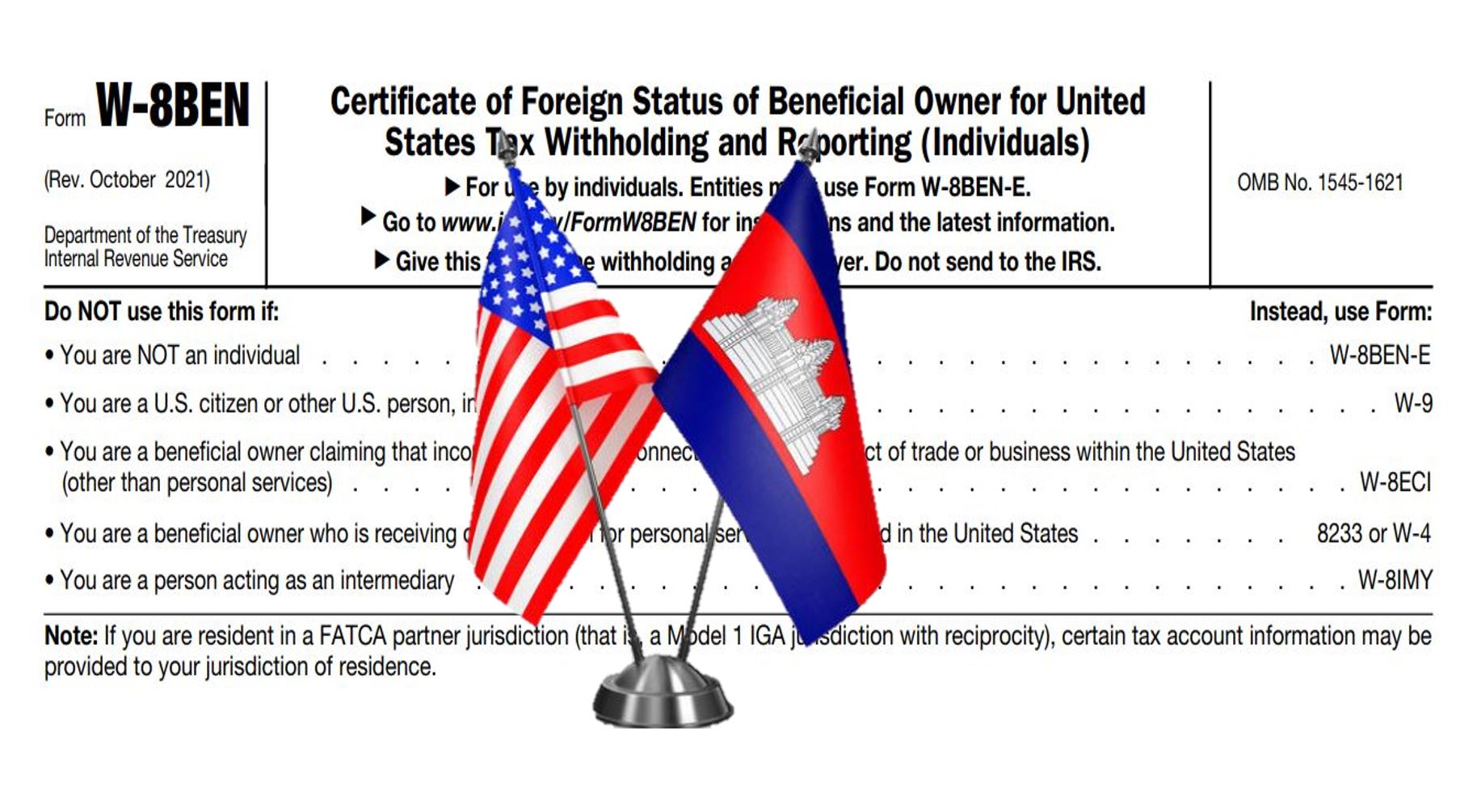Cambodia’s tax system relies on self-reporting and places a significant responsibility on tax residents to declare their worldwide income, including foreign earnings such as dividends, capital gains, and interest. While this system is designed to ensure broad-based tax compliance, there are several complexities, particularly for those with foreign income and for employees who may not be fully aware of their tax obligations. Here’s an overview of Cambodia’s taxation system, the lack of a tax treaty with the U.S., and how taxes are collected from employees.
The Basics of Cambodia’s Taxation System
In Cambodia, tax residents are defined as individuals who have resided in the country for more than 182 days in a 12-month period or who have a primary economic interest in the country. These individuals are taxed on their worldwide income, meaning they must report income from both domestic and foreign sources, including wages, dividends, capital gains, and other earnings.
Cambodia’s personal income tax system is progressive, with rates ranging from 0% to 20%, depending on the income level. For individuals with foreign income, the tax code allows for the use of foreign tax credits to mitigate double taxation on foreign earnings, although the process is often complex without a tax treaty.
No Tax Treaty with the U.S.
Cambodia does not have a tax treaty with the United States. This means that there is no agreement between the two countries to avoid double taxation or share financial information, such as earnings from foreign investments. As a result, individuals who earn foreign income—such as capital gains or dividends from U.S. sources—may find themselves paying taxes in both the U.S. and Cambodia.
In the U.S., foreign investors are subject to withholding taxes on income such as dividends (typically 30% for non-residents). While Cambodia allows tax residents to claim a foreign tax credit for taxes paid to foreign governments, the absence of a tax treaty complicates this process. Taxpayers must provide sufficient documentation to claim this credit, and the lack of automatic data sharing between the two countries means that the Cambodian government does not have immediate access to foreign income details unless voluntarily disclosed by the taxpayer.
Withholding Taxes on Salaries: How Taxes Are Collected from Employees
For income earned domestically, the Cambodian tax system incorporates a withholding tax system, where employers are responsible for withholding income taxes from employees’ salaries at the time of payment. This system ensures that taxes are collected regularly and simplifies the process for employees. The tax rates are progressive, ranging from 0% to 20% based on the amount of salary.
Employers must remit these withheld taxes to the General Department of Taxation (GDT) by the 20th of the following month. While the system is designed to make tax payments easier for employees, some workers may not be fully aware of the tax deductions being made from their salaries. This lack of awareness can create confusion and lead to misunderstandings about their actual tax liabilities.
Employee Awareness and Potential Gaps
While Cambodian employers are required to provide pay slips detailing the gross salary, tax deductions, and net pay, many employees might not fully understand their tax obligations. This gap in awareness can result in employees being unaware that they are paying taxes or not fully understanding how much tax they are paying.
The lack of comprehensive communication about the tax system and the reliance on employers to automatically withhold taxes means that employees may not realize that they are obligated to report their worldwide income if they have foreign investments. For tax residents with foreign income, such as dividends or capital gains from U.S.-based assets, the burden of reporting this income rests on the taxpayer. The Cambodian tax authorities may not be able to detect unreported foreign income unless it is voluntarily disclosed by the individual.
Potential Loopholes for Tax Residents
The Cambodian tax system depends heavily on voluntary compliance, creating potential loopholes for individuals who may choose not to report foreign income. The absence of a tax treaty with the U.S. and the lack of automatic information exchange means that the Cambodian government may not easily track foreign earnings. For individuals with investments in the U.S., such as dividends and capital gains, the Cambodian authorities are unlikely to receive direct information about these earnings unless disclosed by the taxpayer.
- Limited Enforcement of Foreign Income Reporting
Since the Cambodian tax authorities do not automatically receive foreign income details, the onus falls on individuals to report all sources of income, including from foreign investments. While audits or investigations can reveal unreported foreign income, the lack of cross-border data sharing makes it difficult for the government to directly monitor these earnings. - Non-Disclosure of Foreign Investments
Taxpayers who do not voluntarily report their foreign investments may be operating outside the law, but the lack of enforcement mechanisms means that these individuals may not face immediate consequences unless they are audited or investigated. - Foreign Tax Credit Limitations
The foreign tax credit is meant to help reduce double taxation, but without a tax treaty with the U.S., the process can be complicated. Individuals must prove that taxes were paid in the foreign country, and the credit may not fully offset the tax liabilities in Cambodia, leading to potential double taxation on foreign income. - Bank Reporting
While Cambodia does not share tax information with foreign governments, Cambodian banks and financial institutions are subject to anti-money laundering (AML) regulations. These institutions may report certain large or suspicious foreign transactions, which could alert authorities to unreported foreign income. However, this reporting is not as extensive as the information sharing found in countries with tax treaties or global transparency initiatives.
Considerations for Expats and Dual Citizens
Expats and individuals holding dual citizenship should be particularly cautious when considering residency or citizenship in Cambodia. Tax laws in Cambodia can have significant implications for those with foreign income. If you are considering becoming a resident or citizen of Cambodia, it’s essential to fully understand how the tax system applies to both your domestic and foreign income.
Cambodia’s taxation system requires tax residents to report worldwide income, including income from foreign investments. For those with foreign income sources, such as dividends or capital gains from the U.S. or other countries, the lack of a tax treaty with the U.S. can complicate tax obligations and increase the risk of double taxation. Before making a decision to become a tax resident or citizen of Cambodia, individuals with foreign investments should consult with a tax professional to fully understand their tax responsibilities and minimize the risk of non-compliance.
Conclusion: The Honest System and Its Challenges
Cambodia’s taxation system relies on the honesty of its tax residents, who are expected to declare their worldwide income. For employees, the withholding tax system simplifies the process by automatically deducting taxes from salaries. However, a lack of awareness and understanding about tax obligations, especially regarding foreign income, leaves room for mistakes and non-compliance.
The absence of a tax treaty between Cambodia and the U.S. means there is limited cross-border information sharing, making it difficult for the Cambodian government to directly track foreign income. Although Cambodia’s tax system allows for foreign tax credits, the process can be complicated, and individuals are still responsible for self-reporting their foreign investments and income.
To avoid potential pitfalls, individuals with foreign income—whether from the U.S. or other sources—should be proactive in understanding their tax obligations and ensure they properly report all income to the Cambodian tax authorities. Expats and dual citizens should also be aware of the implications of becoming a tax resident in Cambodia before making decisions regarding residency or citizenship. By doing so, they can minimize the risk of double taxation and penalties for non-compliance.
Disclaimer:
Tax laws are subject to frequent changes and may vary based on individual circumstances. The information provided in this article is intended for general informational purposes only and should not be relied upon as legal or financial advice. It is recommended that you consult with a qualified tax professional or legal advisor for specific guidance regarding your individual tax situation.












Leave a Reply